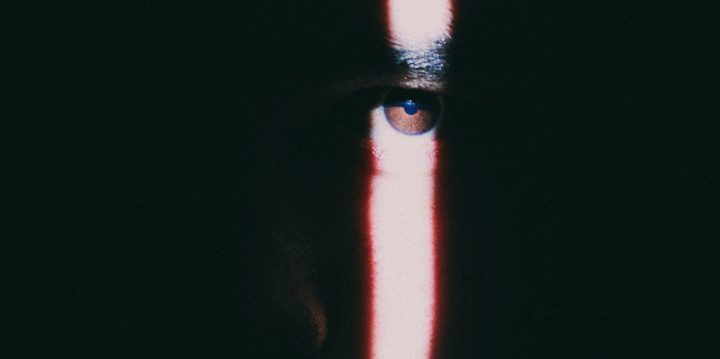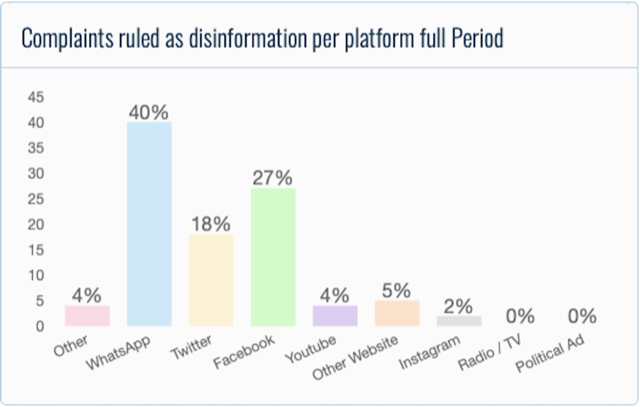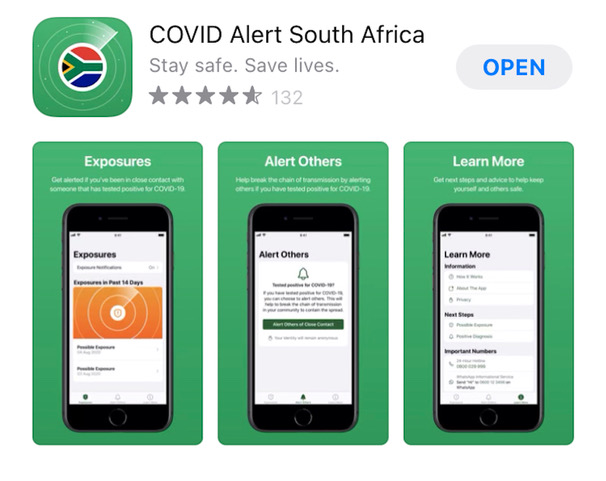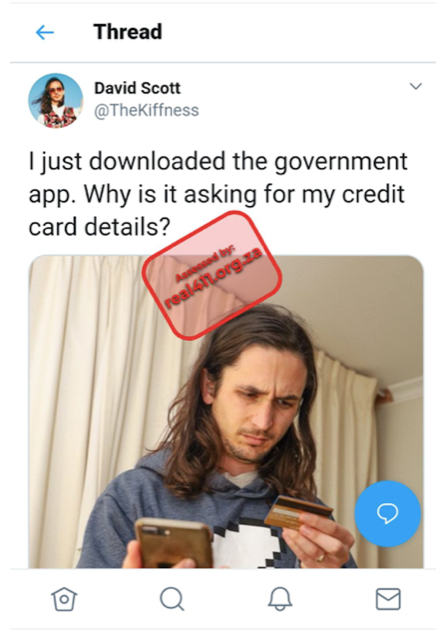OP-ED
Disinformation in a time of Covid-19: Weekly trends in South Africa

Week16: The dangers of spreading disinformation when you have a public profile — and the importance of digital literacy as an active citizen.
A crisis such as the Covid-19 pandemic creates a perfect opportunity for those who wish to cause confusion, chaos and public harm, mis- and disinformation enables them to do just that. This week we look at the responsibility of prominent people to share credible, verified information, and the importance of digital literacy in an age of online disinformation.
Through the Real411 platform, Media Monitoring Africa has been tracking disinformation trends on digital platforms since the end of March 2020. Using the Real411 platform we have analysed disinformation trends which have largely focused on Covid-19. To date, the platform has received 711 complaints. As outlined in the graphic below, only 35% of the complaints have been assessed as disinformation with many other complaints containing other digital offences. In many instances, while complaints have elements of dis/misinformation, they do not meet the established legal criteria for mis/disinformation or they fall into one of the other categories of digital offences.
 As expected, the trend of where problematic content originates from is in line with the most popular social sharing sites (according to submitted complaints). WhatsApp seems to be the most common platform complainants submit content from, followed by Facebook and then Twitter. A breakdown of this is shown in the graph below.
As expected, the trend of where problematic content originates from is in line with the most popular social sharing sites (according to submitted complaints). WhatsApp seems to be the most common platform complainants submit content from, followed by Facebook and then Twitter. A breakdown of this is shown in the graph below.

This past week has been particularly interesting and the Real411 system experienced an influx of complaints — of the same piece of content (we’ll get back to this later). On Wednesday 16 September President Cyril Ramaphosa announced that South Africa was preparing to move to Covid-19 Alert Level 1, from midnight on the 20 September 2020. With the easing of restrictions (including easing restrictions on travel, opening borders, shortening the curfew and revising restrictions on public gatherings) a call to download the Covid Alert SA app was made to encourage the public to take part in the track and trace initiative.
President Ramaphosa said in the announcement:
“Effective testing and contact tracing systems will allow us to quickly identify and contain outbreaks before they spread further. I want to make a call this evening to everyone who has a smartphone in South Africa to download the Covid Alert mobile app from the Apple App Store or Google Play Store.”
This announcement was met with mixed reaction and some felt it was appropriate to raise concerns about the privacy and security of the app. In general terms, this is a positive development for users to question the privacy and data use settings. What’s really interesting is that there appears to be far greater concern for the government’s accessing personal information and data than there is for commercial entities such as Facebook and Twitter.
Of course, we should always be sceptical about people having access to our personal information and data — but we also know that there are many legitimate instances where it is necessary to confirm who we are.
It is thus important that the Department of Home Affairs has our personal data stored securely; that way we can all have our own unique identity numbers, we can get ID cards, drivers’ licences, passports and we know that with other information, it confirms we are who we say we are when we go to vote.
Banks similarly are required to have a lot of our personal information both by law and also to help protect our money. If they only needed our ID number, for example, it would be too easy for people to steal our hard-earned resources. It means that with many things, to live our lives and participate in our society, varying entities either need or ask for personal information.
Access to our data — which is still personal, but goes beyond details such as our full names, ID number and address — comes from living in a digital world where more and more devices and aspects of our lives are connected to the internet.
As a general rule, you can assume that any device connected to the internet in some way is gathering some kind of data. These days, if you own almost any computer or smartphone you generate data about where you live, where you go, how long you stay there, who you talk to, how often you use your device, which apps you use and a whole lot more.
Those with a smartphone and lifestyle apps linked to medical aid, for example, collect not just information/data about where you are but how fast you drive, where you go, what your pulse rate does over the day, how long you sit or stand or walk and or sleep. If they then link it to your credit cards they can then also start to determine what and where you eat, and if you get enough exercise.
If you think that sounds excessive you may be right, but most of us trade off using excellent apps and services in return for sharing our data on a daily basis. Google makes amazing products, and so does Facebook. They also make tons and tons and tons of money (Alphabet, Google’s parent company generated $38.3-billion in revenue in the second quarter this year with Facebook bringing in just over $18-billion in the same period — in the middle of Covid crisis).
The money doesn’t come from products, but largely is made from the data of the billions of users, like us. If you are not paying to use an app or platform, your data is the revenue source for the company in question.
So the trade-off that all of us have agreed to when we sign the terms and conditions of each platform is that we get to use the most wonderful things, like maps, super-cool sharing, Gmail, Android operating systems, search functions and more. In return, they get our data. We mention these entities not because they are the only ones, but because they are among the biggest.
Back to our Covid Alert App. People should be cautious about apps that potentially track where we are, not just for a state entity, but for commercial ones as well. Knowing, however, that there are low levels of trust in government, it is helpful to look at the app and what it does.

Experts have weighed in on the tech used behind the development of the app, focusing on the concerns about the app’s ability to gather information. According to a number of experts, as explained, the app does not gather personal data and does not track movement or location. If you are keen to see a more detailed thread read this.
In other words, as apps go, the one on offer that fulfils a really important public service and does not and cannot harvest data for other purposes. This means that the purpose for which it gathers personal information is limited, which is good when considering the requirements of the Protection of Personal Information Act. A few social media users took to various platforms to air their concerns. One user, in particular, shared a dangerous, irresponsible piece of content directly related to the use of the app.
The complaints submitted related to the following tweet:

Some might recognise the account user to be David Scott — otherwise known from the South African music group, The Kiffness. The tweet read as follows:
“I just downloaded the government app. Why is it asking for my credit card details?”
Now, there are a few problems with this statement and we will explain why looking at it from the point of view of an ordinary member of the public it could be viewed as disinformation. Taking the legal requirements into consideration it is at best very problematic.
This is patently false as after downloading the app, it does not ask users for their credit card information. We encourage you to try it for yourself.
When Real411 reviewers assess complaints, the following definition for digital disinformation is used to guide their decisions. Digital disinformation, according to this definition, “is false, inaccurate, or misleading information designed, presented and promoted to intentionally cause public harm.”
If you consider the tweet in question, and given the already sceptical public perception, this sort of statement can very well contribute to further distrust, confusion, scepticism, and encourage the public to do the complete opposite to the call from the president by not downloading the app.
The user responded to the criticism he was receiving by suggesting it was satire and included a definition of it in his tweet. As part of Real411, there is a very conscious understanding that satire or parody or a public interest means that something that may be false but is satire or parody isn’t likely to be classified as disinformation. So the question that arises is whether the post in question is in fact satire or parody.
As a person who regularly parodies a number of popular songs (and at present particularly with a Covid-19 linked slant) with his own lyrics, the user, David Scott, clearly understands parody. In the current instance, using his own definition, it may well be that he intended it to be funny, implying the app wasn’t safe as it was asking for his details. The problem is of course that many people didn’t think it was funny, and in fact believed that it should be classified as misinformation.
Real411 has received 20 complaints about this one tweet. The question, of course, is not whether people found it funny. Sometimes comedians do things that simply fall flat, and their audiences just don’t find them funny.
However, that doesn’t mean that the particular content wasn’t intended to be a joke or to be funny. In the current instance, this has to be measured up against the reality that we are still in a state of disaster and given the confusion and fears around Covid-19, it may well not be helpful to make jokes about something which may inadvertently cause real harm.
That said, we need to ensure that the bar for saying something is disinformation remains high, not just because it is important to have strong criteria, but because if something is disinformation it can potentially be censored which is a limitation on freedom of expression. Given that the user Mr Scott then highlighted how he intended the post to be satire, and given that he also said he hadn’t downloaded the app, it seems likely he did not intend his post to deceive or seriously suggest that credit card details are required.
The post has been determined not to be disinformation because legally it failed the full test for disinformation (in that it could be limited by the public interest argument that it was parody or satire), but users will see that it is marked as an orange review — which means it met some of the criteria for disinformation.
It is in our view an irresponsible, fear-mongering and deeply cynical post, but not disinformation. As others on Twitter have pointed out, with little knowledge or expertise in understanding apps and how they can access our data, he should probably stick to singing songs that parody the challenges we are all facing under an international pandemic.
The importance of digital literacy in an information age
As part of the Real411 initiative in combating digital offences, one of the key issues it tries to address is that of digital literacy. It is critical that as a public we are informed, we understand and we know when to trust or not to trust the technology we use. There are many, many examples of when not to trust certain social media platforms, apps, or tech platforms.
But when an app is developed in the public interest, taking into account very strict privacy protection measures, and similar apps have been proven worldwide to be effective in assisting with track and trace of Covid-19 infections, there needs to be a point where there is enough understanding and trust to actually use it.
An app such as this will likely have little desired impact if there isn’t sufficient take-up of it — and the government’s ability to track and trace and help prevent a second wave will be deeply undermined. DM


















Comments - Please login in order to comment.